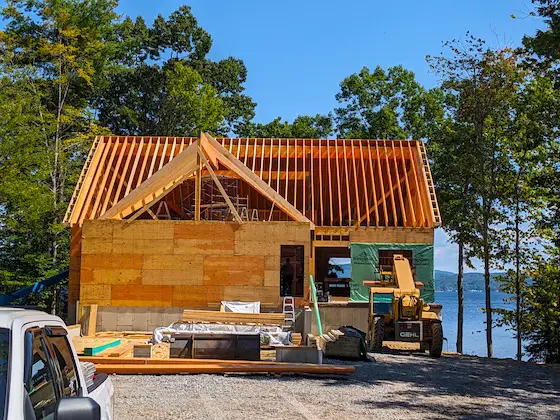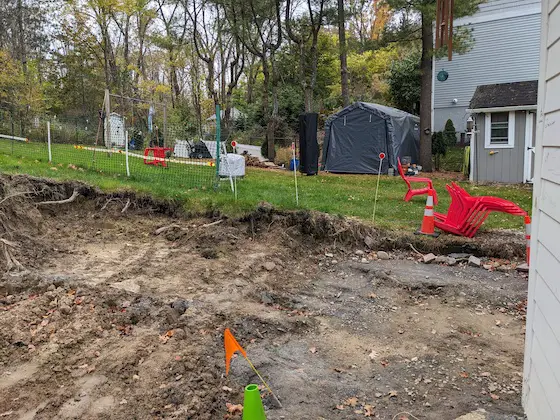Deposit Money to Contractors

The bank financing this project would ROFLOL if the builder asked for money upfront to build this house. Copyright 2023 Tim Carter
Stop Giving Contractors Money Upfront
I’ve set an ambitious goal for this column. It’s my hope it will save collectively at least 100 million dollars. If you and every other reader follow the advice I’m about to share, we can make sure your money will not disappear through the hands of a dishonest contractor like sand in an hourglass.
I do quite a few short 15-minute consult phone calls each week with homeowners. This past week I talked with a man who wanted to know how he could motivate his contractor to start work on a small room addition. The contract sum for the job was just a bit over $100,000.00.
This homeowner and contractor had worked on plans early this past spring and finally signed a contract five months ago in May of 2023. Five months later the only thing accomplished was a heat pump has been disconnected. It was in the way of the room addition. An excavator also ripped out two large tree stumps in the back yard.

The backyard has looked like this for months. Sad. (C) 2023 Tim Carter
About five minutes into the call I asked the man, “How much money did you give the contractor when you signed the contract?” There was a pregnant pause. He then said, “I wrote a check for $77,000.00. The contractor said he needed to purchase supplies.”
In all my years of building and doing autopsies on failed jobs, I had never heard of someone that gave so much money to a contractor. I was in a state of shock and it took me a moment to process this. Sadly just three weeks before I had a very similar call where a husband and wife had advanced $71,000.00 to a contractor for a job costing several hundred thousand dollars. Months had transpired and all that happened was a hole in their backyard.
There are countless reasons why you should never give any contractor money upfront. There are a few situations where it is warranted. You should adopt the same time-tested practice that banks, savings and loans, and credit unions employ. I’ll share that at the end of this column.
First and foremost, contractors don’t pay their employees, subcontractors, or material supply houses in advance. If a contractor does have to pay for materials at the time he purchases them, that tells you the supply house doesn’t trust him to pay a month from now. That should be a huge flashing danger light to you.
When a contractor asks you for a deposit, he’s basically telling you that he doesn’t trust you to pay him. Trust is a two-way street in any situation. You can make the same argument should it come up that you don’t trust the contractor will do the work and do it well!
Pros Don't Need Deposits Normally
Great contractors don’t ask for money up front for a host of reasons. They have tens of thousands of dollars in their business accounts. They can easily pay for things for weeks or a month or two without needing your money. They know they’ll show up and satisfy you so that you’ll gladly pay them.
Fantastic and honorable contractors will negotiate a very fair payment schedule. They might ask that you pay for completed work at the end of each week, every other week, or at the end of a month. These same contractors will produce, if you ask, signed and notarized affidavits in exchange for your check or checks. These affidavits are valuable legal receipts that protect you from mechanic liens.
Don't Advance Job Profit
It’s insanity for you to give a contractor his profit before a job starts. When you do this in the form of a deposit, you remove his incentive, other than his honor, to finish your job on time and with excellent workmanship. Money is the only leverage you have and never forget that.
Any banker or home-loan officer reading this column knows that what I say above is true. A bank would NEVER give money up front to a contractor. Banks and financial institutions require the work to be done and done correctly before they release money. They send out inspectors to jobs before they release construction loan proceeds.
The contractors and suppliers have to provide the affidavits I mentioned before. As soon as those documents are produced, the inspector comes back with a satisfactory report on the completed work, the banks then quickly release the money to pay the contractors and suppliers. You should consider yourself a tiny bank and do the same.
If a contractor asks you for a deposit, you need to stand firm and reply, “Why do you need a deposit? Why should I give you your profit before you start the job?” In rare instances he may give you an honest answer. Your job may require some custom-made item that’s non-returnable. In these cases, the supplier often asks for a 50 percent down payment.
If nothing on your job is custom-ordered, then you’d be foolish to advance money to a contractor. Simply negotiate a fair payment schedule where you pay for work that’s complete and satisfactory.
To protect yourself, you need an itemized quote from the builder or contractor showing what each aspect of the job costs. I happen to sell this list. I developed it using the same percentages banks apply to each part of your new home. This document is invaluable when it comes to you protecting yourself.
Column 1528